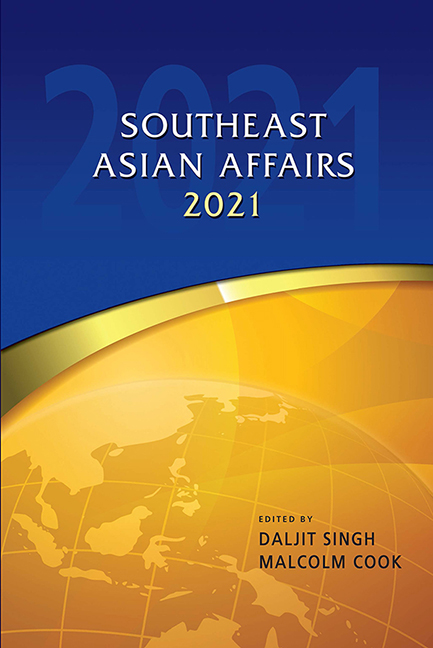Malaysia in 2020: Political Fragmentation, Power Plays and Shifting Coalitions
Published online by Cambridge University Press: 09 October 2021
Summary
What a difference a week makes in politics! The year 2020 saw the collapse of the Pakatan Harapan (PH) government in less than a week—from 23 to 28 February—in what has been dubbed the Sheraton Move. The PH government began the year with persistent political splits caused by the unfulfilled transition of the premiership from Mahathir Mohamad to Anwar Ibrahim before it was deposed in the Sheraton Move. The new coalition of Perikatan Nasional (PN), led by Muhyiddin Yassin, has held on to power despite many forecasts of its impending collapse and multiple political manoeuvrings to bring this about on the assumption its precarious grip on the federal government is thought to be a majority of two parliamentarians in the House of Representatives (Dewan Rakyat). The Muafakat Nasional (MN), an alliance between the United Malays National Organisation (UMNO) and Parti Islam Se-Malaysia (PAS), that backs the PN had proven its mettle in by-elections in 2019 and continued to stabilize in 2020, winning yet another by-election in Sabah and, most crucially, helping the ruling coalition win the Sabah state election in September.
The peculiar, unprecedented, political development in Malaysia in 2020 was the establishment of a ruling coalition that has within it three other coalitions; namely, the MN, Gabungan Parti Sarawak (GPS) and Gabungan Rakyat Sabah (GRS). (The latter two are groupings of state-based parties in Sarawak and Sabah, respectively.) In terms of developments for the Opposition, the PH Plus parties have continued to unravel after Mahathir's reluctance to concede a leadership change to Anwar broke up the original coalition. Elite feuding and factionalism within Parti Keadilan Rakyat (PKR) was sparked by the Azmin Ali camp versus the Anwaristas. The PKR was previously led by Rafizi Ramli, who took leave of politics after being defeated for the post of deputy leader by Azmin Ali. Simmering differences between the Anwaristas and the Azmin camp had vitiated PKR solidarity for most of its tenure in the PH ruling coalition. The factional in-fighting peaked in July 2019 when a series of sex tapes surfaced that alleged Azmin Ali's involvement in a gay relationship. Anwar's calls for Azmin to resign if the allegations were true was met with Azmin's retort that Anwar should “look at the man in the mirror.”
- Type
- Chapter
- Information
- Southeast Asian Affairs 2021 , pp. 169 - 184Publisher: ISEAS–Yusof Ishak InstitutePrint publication year: 2021

